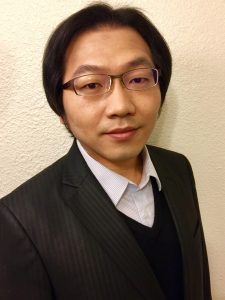2018 Mentored Investigator Grant Recipient — Shih-Hsun Chen, PhD
Project Summary
Ovarian cancer is one of the leading causes of death for women. Approximately 15% of ovarian cancer harbors the inherited mutations in BRCA1 and BRCA2. The mutation carriers of BRCA1 and BRCA2 have up to 50% lifetime risk to develop ovarian cancer. Currently, PARP inhibitors (e.g. Olaparib, Rucaparib) have been approved by FDA to treat advanced ovarian cancer with BRCA mutations. However, long term treatment with PARP inhibitors causes drug resistance in cancer patients. In addition, recent clinical trials show that not all the BRCA tumor patients responded well to PARP inhibitors. Thus, developing novel therapeutic strategies is an urgent and important issue for the mutation carriers of BRCA1 and BRCA2. Interestingly, our recent study suggests that PARylation and dePARylation are not antagonistic processes during DNA damage repair. Instead, transient PARylation and quick dePARylation are sequential events that mediate the recruitment of DNA damage machineries to the sites of DNA damage. PARylation has to be removed by the dePARylation enzymes quickly so that DNA damage machineries are able to recognize DNA lesions and repair them. Therefore, dePARylation also plays an important role in DNA damage repair. And, targeting the major dePARylation enzyme PARG is an alternative approach to abolish PARP-dependent DNA damage repair. Here, we have identified a potent and cell-permeant PARG inhibitor (IC50= 3.77 nM). The PARG inhibitor treatment selectively kills BRCA1-deficient breast cancer cells (HCC1937). In the proposed research plan, we will investigate the role of this PARG inhibitor in DNA damage repair pathways and utilize this small molecule to treat the BRCA-mutant ovarian cancer cells in vivo. This study will not only reveal the mechanism of PARG inhibition in DNA damage response, but also facilitate developing novel therapeutic strategies for ovarian cancer patients.
This grant is made possible in part by a generous donation from Rock ‘N Run.
Bio
Dr. Shih-Hsun Chen is currently a postdoctoral fellow at the Department of Cancer Genetics and Epigenetics, Beckman Research Institute of City of Hope, CA. Dr. Chen is working under the mentorship of Dr. Xiaochun Yu whose lab specializes in understanding the mechanisms of DNA damage and repair in breast and ovarian cancer tumorigenesis and response to therapy. Dr. Chen received his Bachelor’s degree in Biochemical Science and Technology from the National Taiwan University (NTU), Taiwan and then obtained his Ph.D. in Biological Science and Technology from the National Chiao Tung University (NCTU), Taiwan. As a Ph.D. student, Dr. Chen was awarded the Student Distinguished Journal Paper Award by the National Chiao Tung University in recognition of his outstanding scholarly accomplishments. He was also awarded Outstanding Poster Award of 29th Joint Annual Conference of Biomedical Science in Taiwan. In the Dr. Yu’s lab, Dr. Chen’s research focuses on DNA damage response and its role in tumor suppression, especially the molecular mechanism of BRCA1 and 2. His current research interests include understanding the role of dePARylation in DNA damage response and targeting dePARylation by novel small molecules for cancer therapies of BRCA-mutant ovarian cancer. By using a combination of in vitro and in vivo methods, Dr. Chen hopes to not only uncover how PARG inhibitors affect the DNA damage repair, but also develop novel therapeutic strategies for BRCA-mutant ovarian cancer patients.
